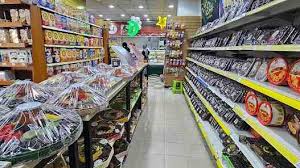NAFDAC Shuts Down Abuja Supermarket Over Chinese-Labeled Goods and Expired Products—What You Need to Know
NAFDAC Shuts Down Abuja Supermarket Over Chinese-Labeled Goods and Expired Products—What You Need to Know
By Achimi Muktar
In a dramatic crackdown, the National Agency for Food and Drug Administration and Control (NAFDAC) has sealed off a Chinese supermarket in Abuja for regulatory violations, including selling products labeled entirely in Chinese and stocking expired goods.
The supermarket, located at Azba Mall, 2 Durban Street, Wuse 2, became the center of attention on Monday after NAFDAC’s enforcement team acted on credible intelligence. According to Shaba Mohammed, NAFDAC’s Director of Investigation and Enforcement, the store failed to comply with the agency’s regulations, sparking a full-scale investigation.
Why the Supermarket Was Sealed
Mohammed revealed that over 90% of the items sold in the store were labeled in Chinese, violating NAFDAC’s labeling requirements. Nigerian law mandates that any product sold in a foreign language must also have an English translation for transparency and consumer safety.
“The information we received indicated that all the items being sold at the supermarket were labeled in Chinese, which violates NAFDAC regulations,” Mohammed said.
Adding to the violations, expired goods were also discovered on the shelves. “Even globally listed items must meet our standards, including proper labeling in English,” he emphasized.
Behind the Scenes of the Crackdown
The investigation began after NAFDAC received tips about the supermarket’s questionable practices. Upon inspection, officials not only sealed the supermarket but also launched a probe into its warehouse operations to ensure no further violations occur.
“This is a serious breach of our regulations,” Mohammed explained. “The supermarket could not provide any approval documents from NAFDAC for items labeled in a foreign language. Nigerians deserve to know what they’re purchasing, and this lack of transparency is unacceptable.”
The Larger Implications
The crackdown raises concerns about how such goods entered the Nigerian market. Mohammed suggested the supermarket might have bypassed NAFDAC’s importation process entirely.
“NAFDAC would never have allowed these items to pass through the ports. They would have been intercepted immediately,” he said.
What Happens Next?
NAFDAC has stated that the supermarket owner will be invited for questioning. If found guilty of violating NAFDAC’s regulations, the agency promises to take strict action, which could include regulatory or administrative measures.
“Not every case goes to court,” Mohammed clarified. “But we will ensure the right steps are taken to protect Nigerian consumers.”
Protecting Consumers’ Rights
The incident underscores the importance of regulatory oversight in protecting public health and safety. With expired goods and unlabeled items potentially posing significant risks, NAFDAC’s actions highlight its commitment to enforcing compliance across the market.
For Abuja residents, this crackdown serves as a reminder to always scrutinize the products they purchase—because when it comes to safety, there’s no room for compromise.


















